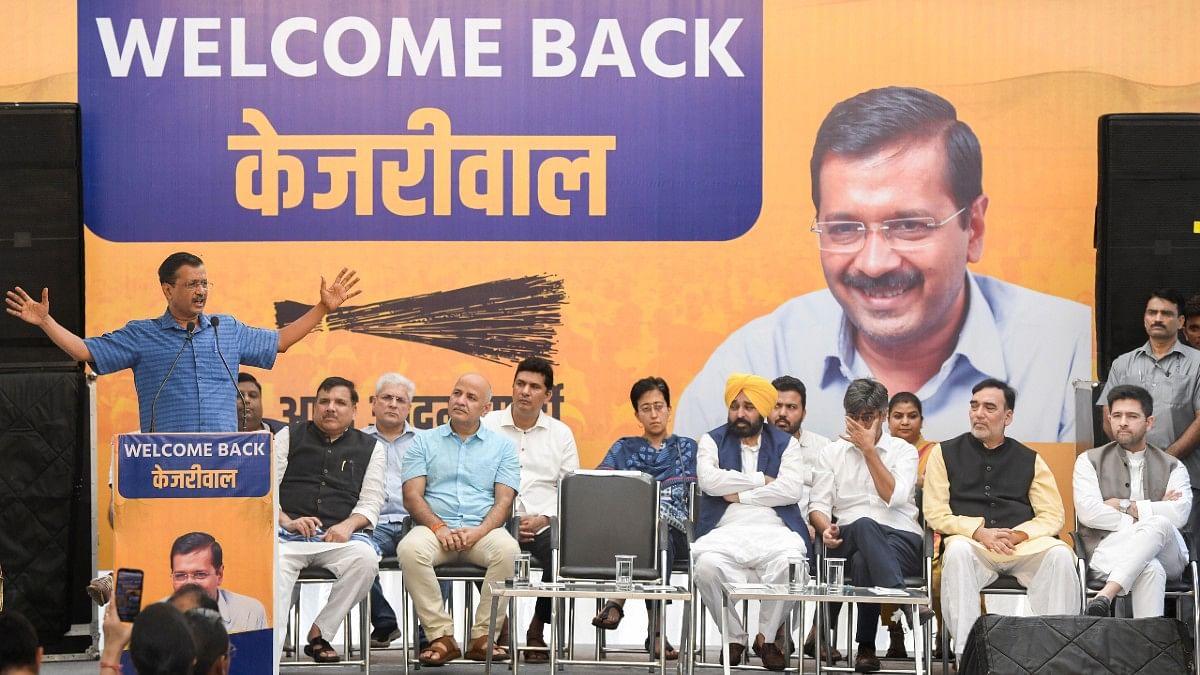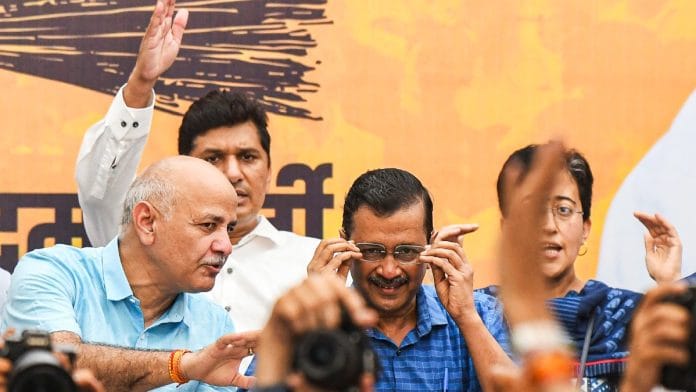New Delhi: By announcing his decision to step down as chief minister of Delhi in the next two days, and elevating a new party face to the post, AAP supremo Arvind Kejriwal has taken a calculated gamble, which has been a constant feature in his journey as a politician and previously, as an activist.
Kejriwal’s shock announcement that he will return as CM only if the people vote the AAP back to power is a bid to outfox the BJP that approached President Droupadi Murmu earlier this month demanding that the Delhi government be dismissed due to “complete breakdown in governance” causing a “grave constitutional crisis” as the CM remained in judicial custody.
“Speaking to my lawyers, I expressed my desire to give up the CM’s post till the time I get acquitted in the case. But they told me that the case may drag on for 10 years or even 20 years. So I have come to the people’s court.
“I want them to give their verdict on whether they consider Kejriwal honest or guilty. Each and every vote for me will be my character certificate,” Kejriwal said in his speech at the AAP’s new headquarters at Pandit Ravi Shankar Shukla Lane in Delhi’s Lutyens zone.

The AAP leadership was also taken aback when Kejriwal shared his decision with them two days ago after walking out of Tihar Jail, where he spent nearly six months in connection with the excise policy case. After all, Kejriwal had vowed never to abruptly give up the post of CM after doing so once before in 2014, merely 49-days into AAP’s first stint in power in Delhi.
In the run-up to the 2015 assembly elections, Kejriwal had gone on apologising to the public for stepping down as chief minister, which led to the dissolution of the Delhi Assembly.
The AAP chief, who had in 2012 sprang a surprise by taking a political plunge after leading an anti-corruption movement, had then said that he deeply regretted his decision, saying he did not anticipate that the Centre would delay holding fresh elections in the national capital.
“But this time, he is clear-eyed about the objectives behind his decision to resign. The bail conditions had made it impractical for him to continue as the CM. After all, he could not even visit the CM office. That was not an issue when he was in jail. But now that he is out, people would expect him to deliver as CM,” a senior AAP leader told ThePrint Sunday.
The idea behind the resignation, paving the way for a new CM, is to generate a sympathy wave for Kejriwal before the next assembly polls, due in February 2025, while also ensuring there are no obstacles in rolling out new welfare schemes such as monthly assistance for women—hanging fire since March this year when it was announced in the Delhi government’s annual budget.
“The party could not have gone on complaining that look our hands are tied because the CM cannot sign files, or hold meetings at his own office. The continuation of existing welfare schemes and launch of new ones will generate goodwill for the party more than anything else. These schemes have made AAP the formidable force that it is today,” the leader quoted above added, explaining the rationale behind Kejriwal’s decision.
In his speech to AAP workers Sunday, Kejriwal made it clear that while he was demanding that elections be held in Delhi along with Maharashtra in November, he was not going for a dissolution of the assembly. “Till elections are not held, someone else from the party will function as CM. The new leader will be picked in a meeting of the AAP legislature party,” he said.
Many would have expected former deputy chief minister Manish Sisodia, who is also out on bail in the case, to be Kejriwal’s natural replacement. But the AAP chief ruled that out, saying even Sisodia did not want to return to his previous positions as deputy chief minister or education minister till the time he gets his name cleared in the excise policy case.
A section of the AAP feels it was a move to clear the decks for Atishi, who already holds the important portfolios of finance, revenue, law and education, PWD and water, in the Delhi government, to take over as the new CM. In his speech Sunday, Kejriwal also referred to the controversy that had erupted after he had written to the L-G from jail, recommending that Atishi be allowed to hoist the Tricolour during Independence Day in his place.
The L-G had snubbed Kejriwal, turning down his request, and nominating Delhi Home Minister Kailash Gahlot to hoist the flag instead. The Delhi Cabinet has room for seven ministers, including the CM. If Atishi is elevated to the CM’s post, there will be room for inducting one more minister, which has usually been a face from the Dalit community.
In recent months, the AAP has lost two prominent Dalit faces, who also served as ministers in the Delhi Cabinet—Rajendra Pal Gautam, who has joined the Congress, and Raaj Kumar Anand, who first joined BSP, only to switch over to BJP. The remaining Dalit faces in AAP include Delhi Assembly Deputy Speaker Rakhi Bidlan (Birla) and MLAs Girish Soni and Praveen Kumar.
(Edited by Amrtansh Arora)
Also Read: Arvind Kejriwal bail finally brings AAP leadership together. Opportunity to regroup, reset







A referendum in the people’s court. What could possibly be more democratic. It should be a simple task for the ECI, which has conducted the Lok Sabha poll in Delhi a few months ago and is required to hold the Assembly election in a few months’ time, to organise it along with the elections in Maharashtra and Jharkhand.